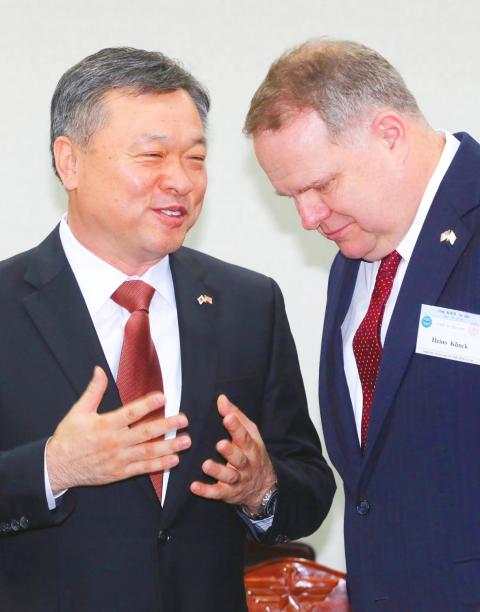Two US representatives arrived in Taiwan on Friday for a five-day visit, the Ministry of Foreign Affairs said yesterday, but declined to comment on the non-publicized visit of a Pentagon official.
After US Senator Ted Cruz attended the Double Ten National Day celebrations last month, the visit by US representatives Bill Flores and Guy Reschenthaler shows the joint support Taiwan enjoys in the US Congress, the ministry said in a statement.
Cruz, Flores and Reschenthaler are members of the Republican Party.

Photo: EPA-EFE
Flores and Reschenthaler are adamant friends of Taiwan, and have signed many bills or joint letters in support of the nation, the ministry said.
A member of the Congressional Taiwan Caucus, Flores has visited Taiwan twice before, and has signed congressional petitions supporting the nation’s participation in Interpol and the International Civil Aviation Organization, it said.
Reschenthaler has signed the US’ Taiwan Reassurance Act, and Taiwan Allies International Protection and Enhancement Initiative, and voted in favor of a resolution reaffirming the US’ commitment to Taiwan and to carrying out its Taiwan Relations Act, the ministry said.
Meanwhile, Heino Klinck, the US deputy assistant secretary of defense for East Asia, also visited Taiwan this week, but his visit was not officially announced. It was reported by the Chinese-language United Daily News on Friday.
Klinck oversees defense policy throughout East Asia, was sworn into office in August, and has three decades of experience in the private sector and the military, according to the US Department of Defense Web site.
He is the most senior Pentagon official to visit Taiwan in more than a decade and his visit came as the US is discussing options for boosting Taiwan’s defense capabilities in the face of increasing threat from China ahead of the Jan. 11 elections, the Financial Times reported yesterday.
American Institute in Taiwan (AIT) Director Brent Christensen did not respond to queries for comment on Klinck’s visit during a news conference on Friday.
The ministry declined to comment on Klinck’s visit, only saying he is the AIT’s guest.
In related news, a former senior adviser in the administration of US President Donald Trump on Friday said that Washington should send a Cabinet official to Taiwan whenever China steals one of Taipei’s diplomatic allies, to send a message to Beijing.
Christian Whiton, who also served as a senior adviser in the administration of former US president George W. Bush, made the remarks at a forum held by the Hudson Institute in Washington.
Whiton also suggested that the US allow Taiwan’s president and minister of foreign affairs to visit Washington to counter Beijing’s political warfare instead of only making transit stops in US cities when visiting Taipei’s allies.
In the past three years, seven diplomatic allies have switched recognition to China, leaving 15 allies that recognize Taiwan diplomatically.
Additional reporting by CNA

MAKING WAVES: China’s maritime militia could become a nontraditional threat in war, clogging up shipping lanes to prevent US or Japanese intervention, a report said About 1,900 Chinese ships flying flags of convenience and fishing vessels that participated in China’s military exercises around Taiwan last month and in January have been listed for monitoring, Coast Guard Administration (CGA) Deputy Director-General Hsieh Ching-chin (謝慶欽) said yesterday. Following amendments to the Commercial Port Act (商港法) and the Law of Ships (船舶法) last month, the CGA can designate possible berthing areas or deny ports of call for vessels suspected of loitering around areas where undersea cables can be accessed, Oceans Affairs Council Minister Kuan Bi-ling (管碧玲) said. The list of suspected ships, originally 300, had risen to about 1,900 as

Japan’s strategic alliance with the US would collapse if Tokyo were to turn away from a conflict in Taiwan, Japanese Prime Minister Sanae Takaichi said yesterday, but distanced herself from previous comments that suggested a possible military response in such an event. Takaichi expressed her latest views on a nationally broadcast TV program late on Monday, where an opposition party leader criticized her for igniting tensions with China with the earlier remarks. Ties between Japan and China have sunk to the worst level in years after Takaichi said in November that a hypothetical Chinese attack on Taiwan could bring about a Japanese

Right-wing political scientist Laura Fernandez on Sunday won Costa Rica’s presidential election by a landslide, after promising to crack down on rising violence linked to the cocaine trade. Fernandez’s nearest rival, economist Alvaro Ramos, conceded defeat as results showed the ruling party far exceeding the threshold of 40 percent needed to avoid a runoff. With 94 percent of polling stations counted, the political heir of outgoing Costa Rican President Rodrigo Chaves had captured 48.3 percent of the vote compared with Ramos’ 33.4 percent, the Supreme Electoral Tribunal said. As soon as the first results were announced, members of Fernandez’s Sovereign People’s Party

MORE RESPONSIBILITY: Draftees would be expected to fight alongside professional soldiers, likely requiring the transformation of some training brigades into combat units The armed forces are to start incorporating new conscripts into combined arms brigades this year to enhance combat readiness, the Executive Yuan’s latest policy report said. The new policy would affect Taiwanese men entering the military for their compulsory service, which was extended to one year under reforms by then-president Tsai Ing-wen (蔡英文) in 2022. The conscripts would be trained to operate machine guns, uncrewed aerial vehicles, anti-tank guided missile launchers and Stinger air defense systems, the report said, adding that the basic training would be lengthened to eight weeks. After basic training, conscripts would be sorted into infantry battalions that would take